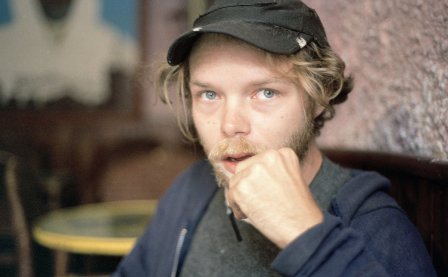Roaming the MoMA at age eight, I remember coming to the entrance of a second-floor gallery with a NO CHILDREN UNDER THIRTEEN warning painted in plain black letters. Its contents — the outlandish topography of sculptures and installation pieces I could make out in bits and pieces through the passageway — took on the dark baleful power of the inaccessibly adult. I took a defiant step in. From that particular vantage (that is, being four feet tall and scared out of my mind of what I might encounter), I possessed a unique awareness of a certain late-20th-century artistic fixation on discomfiture and grotesquery. Dripping scrotal plaster shapes and dismembered mannequins loomed or swung above my head, while off in dark video rooms I came face to face with naked corpulence, with blood and rot and the trauma of sexual abuse. Even more terrifying: the white-walled neutrality of the space, the ambivalent faces of the lookers-on, milling casually through what seemed at the time like an exhibition hall’s-worth of psychic pain made physically manifest.
At their best, experimental trio Black Dice sound like the momentary collision of two universes, like listening in on another place by accident. On the seminal Beaches and Canyons, wails and screams materialize from big, practically post-rockish breakers of drone and percussion, taking on the random poetry of a shortwave numbers station transmission. In their output preceding that album (nicely encapsulated here), that collision took on a more cataclysmic form, fed-back, hoarse-throated, and very “noise,” the province of scuzzy basements and bruised temples, while in later works, it morphed into a consummately wonky electronic juxtaposition of bloops, beats, and vocalizations that has increasingly galled the group’s earlier noise-literate and industrial-loving proponents.
Mr. Impossible extends that trajectory, but before we get into it, let’s get one thing clear: This isn’t me wishing for the good old days or objecting to the “artistic direction” of the two Copelands and Warren in this most recent incarnation of the band. This isn’t a case of “Well, if you didn’t like their last one, you won’t like this one either.” While I understand the accusations that 2009’s Repo swung too far in the direction of facile RISD-kid doodling, the new record has, I think, a very different issue.
Its songs (and that does feel, this time, like the right word) possess a coherent tautness that’ll make people use the word “danceable” and all that shit. You could set somebody like Freddie Gibbs loose on “Spy vs. Spy” with a little quantizing and some sanded-down edges. And there’s nothing wrong with that. But that clean, easy rhythmic backing sits uneasily with the deformed vocals and melting square tones they’ve chosen to play up. It becomes a question of the white walls of the MoMA playing backdrop to the disquieting shapes of sculptor-provocateurs. The video for lead single “Pigs” only reinforces this association. The track, which sounds unmistakably like a perverse remix of “Surfin’ Bird,” pogos pleasingly, which naturally ups the serial-killer quotient as the vocals morph into tortured moans. Its visual accompaniment, directed by the band itself, plays like Nam June Paik plus dildos and lacerations. In short, it feels like a parody of experimentalism, like what “video art” looks like in a TV teen melodrama.
There’s nothing necessarily wrong with unpleasantness or provocation as an artistic M.O.; plenty of brilliant men and women have worked exclusively in that mode. I don’t even think using those methods creates a ceiling for the potential greatness of a work. But it’s simply not what Black Dice, in any of their incarnations, do best. Their manipulations of texture and rhythm, longform suites unfolding with shamanic focus, once gave the impression of breaking new sonic ground, of amalgamating the best of multiple disciplines and genres, lending them their much-discussed unclassifiable-ness. Here that recombination feels glibber: a hip-hop beat here, a moment of industrial trudge, a bit of stop-start synth. And while that combination yields some moments of blissful jitteriness and pop rejiggering, Mr. Impossible never gets too far past being big, dumb, and unquantifiably creepy.
More about: Black Dice




